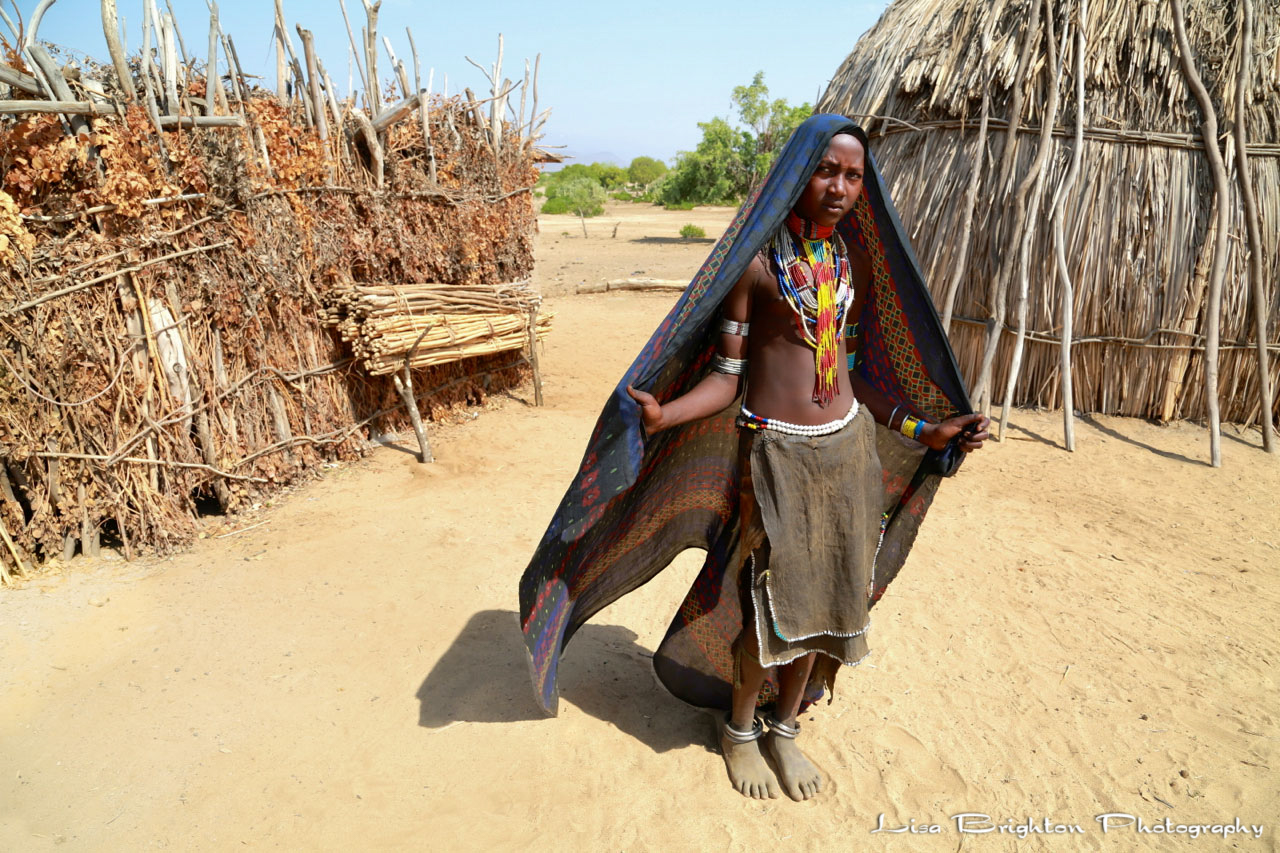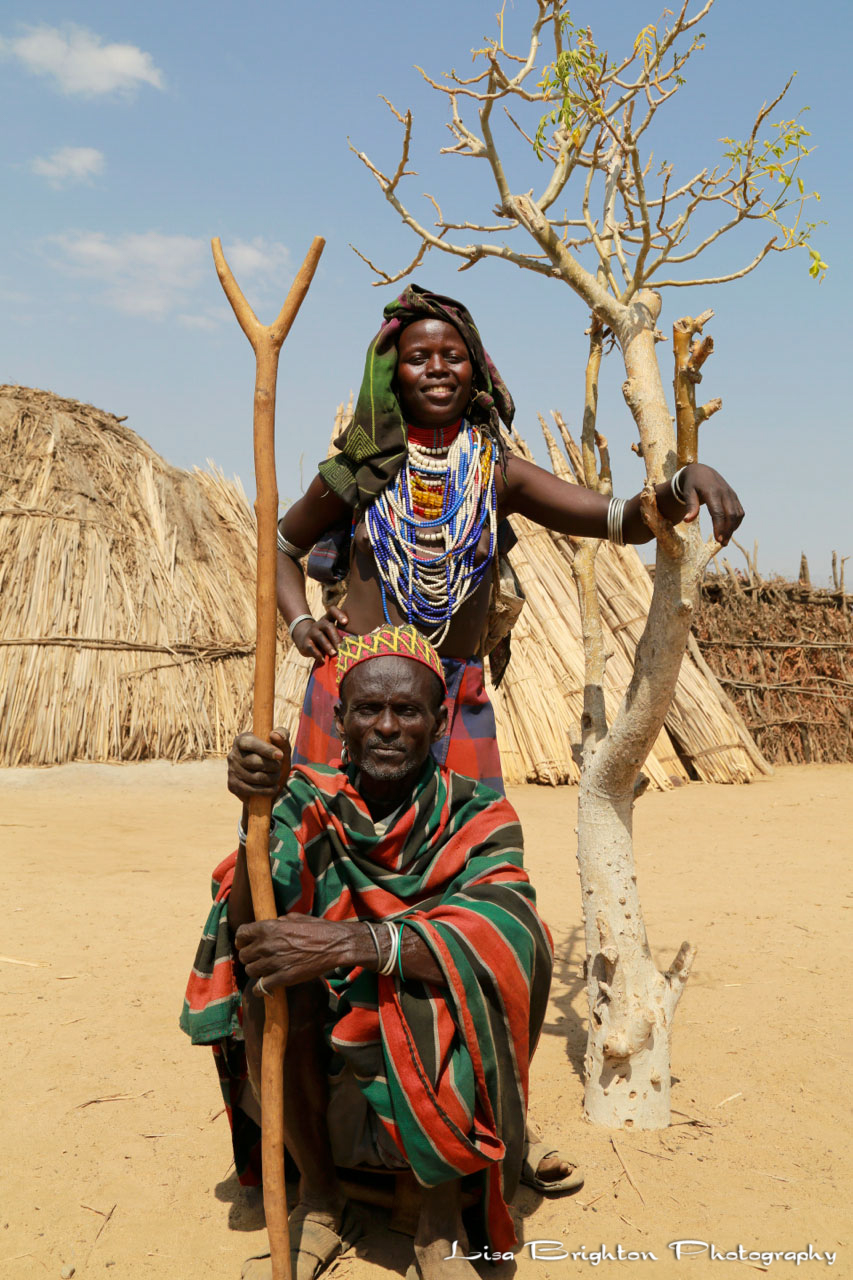9. Enough is Enough
 This is the last village I’ll be exploring before flying north tomorrow and heading back to the country’s capital, Addis Ababa. I have mixed emotions about leaving the Omo Valley, especially because I’ve worked hard this week to connect with the culture and learn about the people’s day-to-day lives. I’ve focused my lens and curiosity primarily on the lives of the women. Now, I visit the Arbore people and admire the beauty of the women and their striking use of fabric and bead layering. But one harsh aspect of their lives is on my mind — female genital mutilation, or FGM. This cutting ritual, typically done without anesthetic, removes a female’s genitals with knives, scissors, razor blades or even broken glass. While researching for this journey, I learned that most of the tribes I would be visiting in Ethiopia practice this tradition. I was shocked to learn that nearly 150 million women worldwide are affected by this practice, which in some communities is an attempt to control a woman’s sexual feelings. In this remote village, the ritual is often performed on a woman’s wedding day — after the marriage ceremony and before consummation.
This is the last village I’ll be exploring before flying north tomorrow and heading back to the country’s capital, Addis Ababa. I have mixed emotions about leaving the Omo Valley, especially because I’ve worked hard this week to connect with the culture and learn about the people’s day-to-day lives. I’ve focused my lens and curiosity primarily on the lives of the women. Now, I visit the Arbore people and admire the beauty of the women and their striking use of fabric and bead layering. But one harsh aspect of their lives is on my mind — female genital mutilation, or FGM. This cutting ritual, typically done without anesthetic, removes a female’s genitals with knives, scissors, razor blades or even broken glass. While researching for this journey, I learned that most of the tribes I would be visiting in Ethiopia practice this tradition. I was shocked to learn that nearly 150 million women worldwide are affected by this practice, which in some communities is an attempt to control a woman’s sexual feelings. In this remote village, the ritual is often performed on a woman’s wedding day — after the marriage ceremony and before consummation.  In Western society, the wedding night is traditionally a bonding experience between a loving couple. In this tribe, it’s a night when the bride’s legs are tied together from hip to ankle to help aid in the healing process. She’s not reunited with her husband until she heals. This is difficult to fathom not only as a woman, but also as a photographer enjoying my journey in Ethiopia. I’ve witnessed the obvious strength, sense of confidence and outgoing nature of the women here. Proof of this tribe’s assertiveness is literally up and down my white shirt sleeves in the form of dirty hand prints. I’ve been tugged by the women who want their images taken, and I can’t imagine a single one of them wanting to comply with FGM. Then I remember what I read about being ostracized by the community if a woman doesn’t cooperate. They have to comply… They’ve adapted to survive. And, like the other women I’ve met here, the Arbore are seemingly comfortable with Westerners visiting their village and photographing them. Most of the women seem to enjoy stepping in front of my lens and then seeing themselves in my photos. Though questions about FGM and how it affects women’s lives are dominating my thoughts, I don’t talk to the women about it. I want learn and share information, but I don’t. Boundaries are delicate, especially as a guest with a lens. I don’t want to abuse the privilege of being in their village. I think they’ve already been abused enough.
In Western society, the wedding night is traditionally a bonding experience between a loving couple. In this tribe, it’s a night when the bride’s legs are tied together from hip to ankle to help aid in the healing process. She’s not reunited with her husband until she heals. This is difficult to fathom not only as a woman, but also as a photographer enjoying my journey in Ethiopia. I’ve witnessed the obvious strength, sense of confidence and outgoing nature of the women here. Proof of this tribe’s assertiveness is literally up and down my white shirt sleeves in the form of dirty hand prints. I’ve been tugged by the women who want their images taken, and I can’t imagine a single one of them wanting to comply with FGM. Then I remember what I read about being ostracized by the community if a woman doesn’t cooperate. They have to comply… They’ve adapted to survive. And, like the other women I’ve met here, the Arbore are seemingly comfortable with Westerners visiting their village and photographing them. Most of the women seem to enjoy stepping in front of my lens and then seeing themselves in my photos. Though questions about FGM and how it affects women’s lives are dominating my thoughts, I don’t talk to the women about it. I want learn and share information, but I don’t. Boundaries are delicate, especially as a guest with a lens. I don’t want to abuse the privilege of being in their village. I think they’ve already been abused enough.
